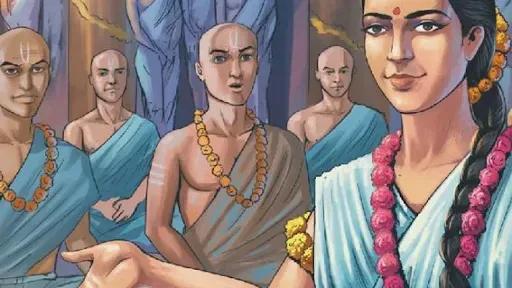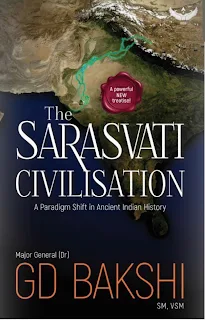Friday, 7 October 2022
Now you know!
Tuesday, 4 October 2022
Between doing evil and setting it straight!
Director: Rajan Madhav
Accidents happen suddenly and at random. We are made to believe that things occur for no rhyme or reason. In the churning of cosmic soup, the flapping of the butterfly wings may create a hurricane. Is it really? A perfect crime is committed when no trace of external interference with an act of nature results in a negative outcome. Nobody will blame anybody when a typhoon sweeps over a nation, as proving secret weather-changing experimentation via covert governmental projects is not easy!
This is a fascinating typical Tamil movie with a different storyline. Sadly, it is not an original offering, but its storyline is based on Alfred Hitchcock's 'Stranger on the Train.' (1951). The story has been modified to suit the local scenery and the turn of the tide of time. The strangers are not on a train but are hitchhiker-driver combo; the train is a car speeding on a highway from Bangalore to Chennai.
Nanda is a musician. Upon his return from Bangalore, after a movie deal, his car breaks down. He manages to hitch a ride from Arjun, a weird character that he had seen the previous night drunk and about to jump off a balcony! Nanda takes the ride anyway.
Along the journey, Nanda and Arjun find commonalities. Nanda is in a loveless marriage, and Arjun is a wealthy tycoon's son wronged by his mean father. After a few friendship-bonding moments, Arjun proposes a mutually beneficial plan - each was to murder the other's misery...
Nanda baulks at such a proposition and scoots off. He thinks it is all forgotten. Nanda's wife is increasingly irritating him and is overtly flirting with her working colleagues. Nanda himself feels like putting an end to her life when he feels the opportunity is ripe, but his inner consciousness stops him. Then Nanda receives a call from the police that his wife had been killed in a hit-and-run accident. Arjun had started his end of the bargain even without Nanda's consent. Then Arjun's cat and mouse game begins, trying to force Nanda to reciprocate.
It balances ending evil, doing the right thing and satisfying the sane conscious mind. Man, we have developed two contradictory assets over generations of mitosis and natural selection. We have gained the curse of a good memory and the often feuding of the reptilian mind and the policeman of our superego.
Saturday, 1 October 2022
Burning, burning...
 |
| ©FG |
Those, however, were too few and far between. The same hands that express gratitude to you would be the same ones that point accusatory charges against you. You thought they were placing you on a dais like they do to their Gods, right? When they deified you, they meant you are supposed to be infallible, and when things go south through no fault of yours, they cannot blame God, so they blame you.
If you feel it is unfair to bear the brunt of such responsibility on your tiny shoulders, by all means, move on. They are others who would gladly take over until they, too, burned out.
Thursday, 29 September 2022
Blood is thicker than water?
Monday, 26 September 2022
Time and place for everything?
Director: Park Chan-wook
 The ageing brain finds it difficult to learn new tricks. Hence, it compensates for its deficiencies by filling them with old remote thoughts. Whilst watching this Korean thriller noir, a conversation with an old friend, 20 years previously, resurfaced.
The ageing brain finds it difficult to learn new tricks. Hence, it compensates for its deficiencies by filling them with old remote thoughts. Whilst watching this Korean thriller noir, a conversation with an old friend, 20 years previously, resurfaced.
P was an ambitious young man when he was posted as a secondary school teacher in a remote part of the country. His rumbling young heart knew then that he was made for bigger things in life, but teaching a bunch of uninitiated young kids in the periphery was a start.
Being well versed in the Malay Language, he was quite a hit amongst the locals, particularly his young lady colleagues. These young lassies were all over him, eating out of his hand and at his beck and call. Bending over backwards to be in his company, there were unabashed invitations for intimacy.
 |
| Such good chemistry, sensual without being sexual |
On further prodding by his nosey on more juicy details, P told them there was nothing more to say. Nothing happened. With a blank face, he said something to the effect of, "one should defecate where he eats!"
P went on to spend his free time preparing for his law degree. Soon enough, he resigned from his teaching stint and is now a flying legal eagle.
In every profession, situations may arise where one can obtain personal favours. He may be lured to use his positions to curry flavours to fulfil self-interests. For that reason, to be professional in a particular job would mean to put the emotional aspect into makings job-related decisions, but to decide with the head and not the heart. But then, when Adolf Eichmann made similar decisions, the world accused him of treating an act of evil as the banalest thing to do.
The protagonist of this Korean thriller noir, Hae-joon, probably did not have a friend like P to advise him on how to act professionally. Married but a weekend husband only as he is stationed as a police detective in another town, he is assigned to investigate a hiker who is found dead. During the course of his investigation, ruling out the hiker's sensual wife, Seo-rae, as a possible suspect, he is drawn closer to her. A Chinese immigrant, a caretaker of the elderly with a clear alibi of innocence, she is off the hook. But there seems more than meets the eye as Seo-rae is seen six months later with another husband who just happens to die soon after their meet!
Thursday, 22 September 2022
Just to de-stress!
Director: David Leitch
Monday, 19 September 2022
Out of India it is, not Aryan Migration theory!
Author: Maj General Dr GD Bakshi
In secondary school history class, we were taught to believe that civilisation developed circa 1500 BCE around the Indus River. Then came mighty learned men from the Steppe Land on horsebacks to bring knowledge and wisdom to this region. The original inhabitants of this region ran helter-skelter, crossing the Vindhya Hills to root themselves in the Southern part of the subcontinent. We vaguely remember being told about the Aryan Invasion Theory and the clear demarcation between the Northern part of India and the South.
.
Later in life, we were exposed to Mahabharata, Ramayana and Bhagavad Gita. What was taught as mythological tales, we later found out, was actually backed with scientific facts. For starters, the birth dates of specific icons could be fact-checked as their birthdates were described in relation to astronomical positions. These scriptures also illustrate a lush culture along the banks of a massive river with a width of up to 6-8km with torrents of glacier water, traversing 4,600km from the Himalayas. The scientific calculations of this event place it somewhere 5,000 to 6,000 years before the present, i.e. ~3000 BCE. It is also said to bear water from Yamuna and Sutlej.
Bunkum, say the Western historians and leftist-minded members of the academia. Even modern-day Indian historians, among which Romila Thapar is infamous, concur with the theory that Aryan Invasion is true and the Sarasvati River did not exist.
Since the 1970s, with the aid of satellite images, traces the presence of a large basin reminiscent of a dried-up river. We know Carbon C14 dating on archaeological finds is not easy. However, local archaeologists are confident that Indus-Saraswati could be as old as 9,500 years before the present. If that is true, the Indus-Saraswati must be the cradle of civilisation, preceding the Tigris-Euphrates one.
 |
| The Dancing Girl of Mohenjo-Daro Indus Valley Civilisation ?2300-1750 BCE. |
Archaeological excavation reveals they find spoils away from Indus, nearer to Saraswati River's 'mythical' placement. Perhaps, the descriptions of Rig Veda, about the glory of Saraswati and the glorious kingdom surrounding Saraswati, actually denote Harappa civilisation. Is it not amazing that cultural traditions, as seen in statues from Mohinjo-Daro and Harappa, are still practised in the sub-continent even today?
Geologists suggest massive technotic plate movements that made the Yamuna and Salrej rivers change course between 4,600 and 2,700 years ago. Only during monsoons the Sarswati used to drain. Later, Saraswati water went underground, leaving pockets of pools. The Ganges became more prominent as Yamuna and Sutlej brought in a glacial stream of water. So, the Saraswathi described in Rig Veda corresponds to the lifeline of the scriptures.
If the Aryans did indeed move into Indus/Sarasvathi Valley, we would have been moving into a desiccated plain where the rivers had run dry by 1500 BCE. If the Aryans brought in culture, archaeological dating of Mohinjo-Daro and Harappa buildings would pre-date this timeline.
Now, who are these Aryans? Are they alien immigrants or indigenous to the area? Genetic tracking via maternal and paternal DNA to differentiate Aryans and Dravidians and to prove migration into India does not seem convincing. Its methodology is also allegedly flawed. Its sample failed to include subjects from essential groups. There is proof Aryans were local people who had evolved all through the Paleolithic (Stone Age) through to the Neolithic and Chalcolithic (Bronze) stages of civilisation. They had become farmers and domesticated plants and animals.
In fact, many now believe that, just like there was an 'Out of Africa' theory to explain the migration of primitive homosapiens, there is a convincing case for an 'Out of India' deduction to expanding human civilisation. There is ample proof that eco-catastrophe made them out of Indus/Saraswati.
It looks like the age-old Aryan Invasion Theory propagated by Max Müller, and Mortimer Wheeler will get the boot. There is evidence of genocide to convince us that Aryans butchered cultured Dravidians and drove them southwardly. The theory that came out later, Indo-Aryan Migration, says that Aryans supposedly came in droves to a desert land.
The colonial masters probably introduced the Aryan Invasion Theory to convince their subjects that they had indeed been colonised for aeons. In a way, it was their justification to rule over India and 'civilise' them. The British left long ago, but the push to maintain the status quo is ever so strong. Detractors have, in their sleeves, many deceptive ways to prove their point of Europe and Central Asia being the cradle of civilisation, which forms the basis of Judeo-Christian ideology, not Hinduism, not India. It is peculiar that features seen in the dancing girl of Mahinjo-Daro, like the multiple bangle adornment and the vermillion marking at the parting of the hair characteristic of married women in the subcontinent, are still present today.
It drives home the point that Indian or Hindu culture, as that was how the way of life practised in this part of the world was referred to, still stand tall despite all the external forces and invaders that permeated and tried to dominate over theirs.
[P.S. The analysis of DNA samples extracted from the skeleton of a woman buried in Rakhigarhi, Haryana, four to five millennia ago rejected the theory of Steppe pastoral or ancient Iranian farmers as a source of ancestry to the Harappan population. It demolished the hypothesis about mass human migration during Harappan time from outside south Asian genes. The sample had traces of genes of Iranian lineage. Since the pieces were as old as 11,000 to 12,000 years ago, it is way before Harappan.]
-
Razakar: The Silent Genocide Of Hyderabad (Telegu, 2024) Director: Yata Satyanarayana In her last major speech before her disposition, Sh...
-
Now you see all the children of Gemini Ganesan (of four wives, at least) posing gleefully for the camera after coming from different corners...
-
In the Malay lingo, the phrase 'ajak-ajak ayam' refers to an insincere invitation. Of course, many of us invite for courtesy's ...













.jpeg.webp)





